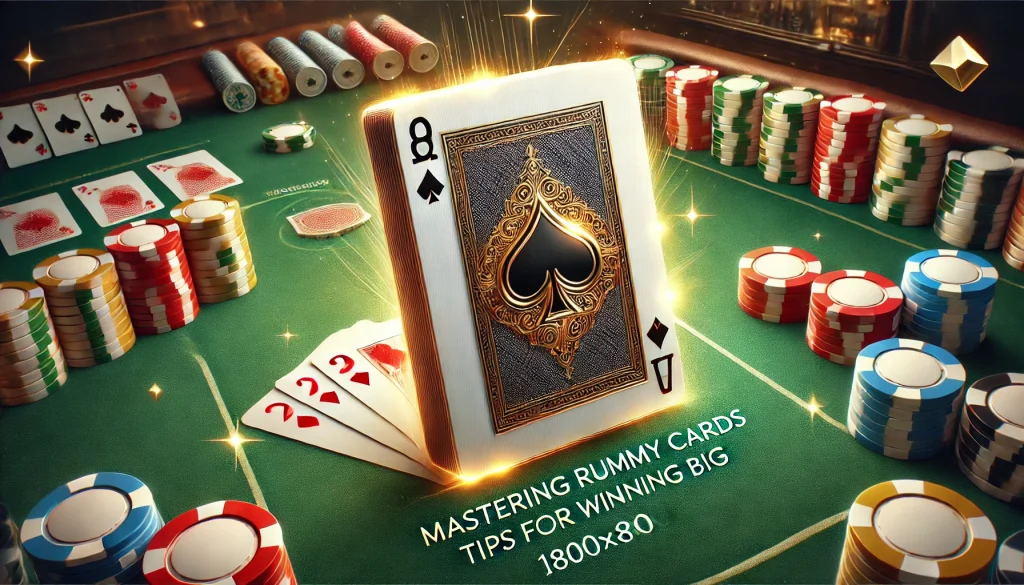
Mastering Rummy: A Comprehensive Guide The combination of skill, strategy, and a little bit of luck in the well-known card game rummy has enthralled players rummy culture worldwide. Forming sets and runs from a card hand is the fundamental idea of the game. While a run is made up of three or more consecutive cards of the same suit, a set is made up of three or four cards of the same rank but different suits. By combining these combinations before your opponents do, you can win the game by going out first or finishing with the fewest points at the end.
Two or more players can play the game, 777 slots and the rules can change slightly depending on whether you’re playing Indian Rummy, Gin Rummy, or another variation. A certain number of cards are usually dealt to each player, and the remaining cards are arranged in a draw pile. In order to improve their hands and monitor the moves of their opponents, players alternately draw from the draw pile or the discard pile. Any player hoping to Classic 777 Slots APK succeed in rummy must comprehend these fundamental concepts.
Creating a Successful Rummy Strategy. In order to be successful in Rummy, players need to build a strong strategy that includes both offensive and defensive tactics. Tracking what your opponents are gathering while concentrating on forming melds as fast as possible is one strategy that works well.
You can both advance your hand and thwart your opponents’ plans with this dual focus. Overcoming Obstacles & Handling Your Hand. For example, it might be a good idea to keep cards that could complete their melds if you see that your opponent is picking up cards of a certain suit. This will stop them from going out.
This strategy can give you an advantage in the game and seriously impede their progress. Adjusting to the Dynamics of the Game. Effective hand management is another essential component of strategy. Holding onto versatile cards that can contribute to several possible melds will help players keep their options open. Keeping a 7 of hearts, for instance, might be useful if you have 6 & 8 of hearts, but it could also be a part of a set if you get another 7 from a different suit.
This adaptability may be essential for changing with the game’s changing dynamics. When playing Rummy, one of the most important decisions is whether to discard a card. While keeping cards for too long can clog your hand and impede your progress, discarding too frequently can give your opponents the precise cards they need to finish their melds. When discarding cards that are unlikely to help your own melds, it’s a good idea to be careful about what you reveal to your opponents. For example, it might be prudent to discard lower-value cards that are unlikely to assist you in the near future if your hand contains multiple high-value cards but no melds right away.
On the other hand, it is crucial to hold onto the card if you are almost done with a meld but still require one more. It is crucial to carefully consider each decision because the timing of your discards can have a big impact on the game’s outcome. It takes both foresight and flexibility to maximize melding opportunities. While keeping an eye out for possible combinations from their hand, players should also be aware of the cards that other players are discarding.
Making several possible melds at once is a useful strategy. For instance, by giving yourself several opportunities for success, a set of cards that can also form a run increases your chances of going out. Players should also keep an eye on the cards that are pulled from the discard pile.
An opponent’s intention to form particular melds may be indicated if you observe that they are routinely picking up particular cards. By observing these trends, you can modify your own approach by either keeping cards that have the potential to complete their melds or discarding cards that are less likely to help you in the long run. The ability to observe is essential to learning Rummy. Through careful observation of your opponents’ moves, including what they draw, what they discard, and how they respond, you can learn a great deal about their tactics and goals.
An opponent may be nearing finishing their melds & attempting to avoid drawing unwanted cards if, for example, they tend to pick up cards from the discard pile more often than they draw from the draw pile. Also, knowing the patterns of your opponents can assist you in making wise choices regarding your own gameplay. You may decide to discard lower-value cards that might aid a player in finishing their melds if you observe that they frequently hold onto high-value cards for an extended period of time.
On the other hand, if your opponent discards cards quickly & without hesitation, it might indicate that they are not about to go out, which would let you play with greater risk. Jokers and wild cards offer players special chances to improve their hands while also drastically changing the dynamics of Rummy gameplay. These multipurpose cards are extremely valuable assets because they can be used to form melds in place of any other card. But with power comes responsibility; in order to get the most out of them, players need to use them wisely. For instance, if you have a joker and two 5s of different suits, you can make a set in which the joker represents the third 5.
By using a joker, you can bridge the gap and go out earlier than you would have otherwise if you were on the verge of finishing a run but were missing one card. It’s crucial to think about how employing a joker might impact your overall plan, though, as there are situations when keeping it for later use is preferable to using it right away. Rummy requires good hand management since it has a direct effect on your ability to form melds and react to moves made by opponents. Maintaining enough cards to make possible melds while avoiding clutter that could impede progress is what players should aim for.
During gameplay, a well-organized hand makes it easier to make strategic decisions and enables rapid evaluations of the possible combinations. It’s equally important to keep track of discards because knowing what has been thrown away can help you decide which cards to keep or discard yourself. Hold onto higher-value cards that might still be able to help with your melds, for example, if you see that a number of low-value cards have already been thrown out. You can modify your strategy by anticipating what cards your opponents might be looking for or avoiding by keeping track of discards. The key to winning at rummy is keeping your cool while playing.
As players compete for victory, the game can get intense, but maintaining composure promotes better decision-making & clearer thinking. Using mindfulness exercises or taking deep breaths in between turns can help prevent anxiety because emotional reactions can impair judgment. Distractions can result in missed opportunities or bad decisions, so focus is equally important. In order to stay involved in the game at all times, players should focus on both their own hands and their opponents’ movements. Players can improve their overall performance in Rummy and sharpen their strategic thinking by developing a focused mindset. In summary, learning the basics of Rummy, creating winning strategies, having good observational skills, and remaining composed while playing are all necessary for mastering the game.
In this captivating card game, players can greatly improve their chances of winning by developing these abilities and using them carefully each session.lottery sambad old




